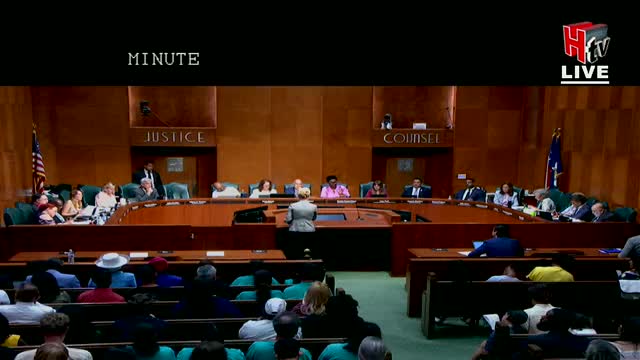Civil Rights Advocate Tanner Wood Downing Challenges Texas Indictment Procedures in Supreme Court
July 29, 2025 | Houston, Harris County, Texas
This article was created by AI summarizing key points discussed. AI makes mistakes, so for full details and context, please refer to the video of the full meeting. Please report any errors so we can fix them. Report an error »

In a passionate address at the Houston City Council meeting, civil rights advocate Tanner Wood Downing from Washington, D.C., raised significant constitutional concerns regarding the legal practices in Texas. Under the bright lights of city hall, Downing emphasized the importance of adhering to the U.S. Constitution, particularly highlighting the Fifth Amendment's requirement for grand jury indictments in serious criminal cases. He argued that Texas's alternative legislation, which allows charges to be brought by information rather than indictment, undermines this constitutional guarantee.
Downing's remarks were not just theoretical; he represented over 700,000 individuals currently imprisoned in the U.S. who he claims are victims of these constitutional violations. He asserted that the state’s practices violate both the Fifth and Fourteenth Amendments, which protect citizens' rights and privileges. He urged the council to recognize that public officials, including police and prosecutors, are bound by their oaths to uphold the Constitution, and that any deviation from this duty could lead to legal repercussions.
As he concluded his address, Downing warned the council members that by funding these practices, they might be complicit in the violation of constitutional rights. His call to action was clear: public officials must not enforce laws that contradict the Constitution, and citizens should not bear the financial burden of such actions.
Following Downing, local resident Harold Eaton shared his concerns about the changing dynamics in the Meyerland area, reflecting a growing unease among community members about safety and governance. The meeting highlighted a critical intersection of civil rights advocacy and local governance, leaving attendees to ponder the implications of these discussions on the future of law enforcement and community trust in Houston.
Downing's remarks were not just theoretical; he represented over 700,000 individuals currently imprisoned in the U.S. who he claims are victims of these constitutional violations. He asserted that the state’s practices violate both the Fifth and Fourteenth Amendments, which protect citizens' rights and privileges. He urged the council to recognize that public officials, including police and prosecutors, are bound by their oaths to uphold the Constitution, and that any deviation from this duty could lead to legal repercussions.
As he concluded his address, Downing warned the council members that by funding these practices, they might be complicit in the violation of constitutional rights. His call to action was clear: public officials must not enforce laws that contradict the Constitution, and citizens should not bear the financial burden of such actions.
Following Downing, local resident Harold Eaton shared his concerns about the changing dynamics in the Meyerland area, reflecting a growing unease among community members about safety and governance. The meeting highlighted a critical intersection of civil rights advocacy and local governance, leaving attendees to ponder the implications of these discussions on the future of law enforcement and community trust in Houston.
View full meeting
This article is based on a recent meeting—watch the full video and explore the complete transcript for deeper insights into the discussion.
View full meeting
